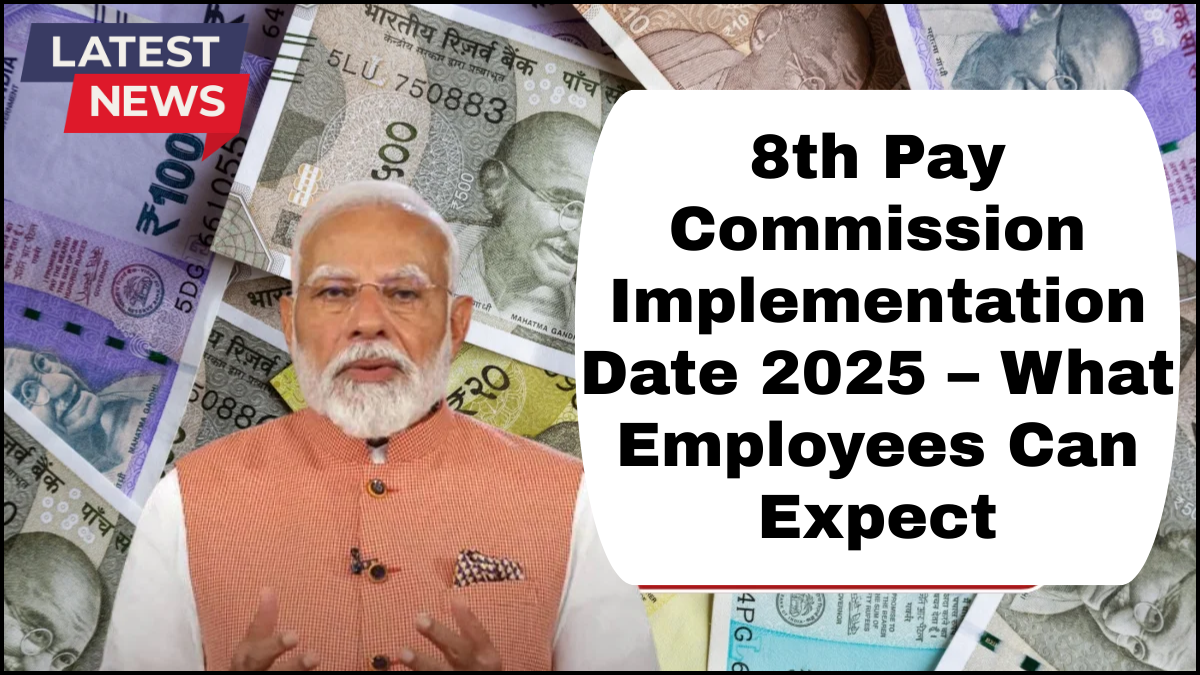The year 2025 is shaping up to be significant for central government employees in India, as discussions around the 8th Pay Commission continue to gain momentum. While no official notification has been issued yet, the possibility of a Govt Salary Revision 2025 is drawing attention from millions of employees and pensioners who rely on structured pay updates for their financial planning.

Below is a comprehensive breakdown of the expected implementation timeline, possible changes, and what employees should realistically prepare for.
What is the 8th Pay Commission?
The Pay Commission is a body set up by the Government of India to review and recommend changes to the salary structure, allowances, and pension benefits for central government employees. Traditionally, a new Pay Commission is formed every 10 years.
The 7th Pay Commission was implemented in 2016, making 2025 a logical timeframe for the Govt Salary Revision 2025 under the 8th Pay Commission. However, the actual date depends on political, economic, and fiscal considerations.
Expected Implementation Timeline for 2025
While the official 8th Pay Commission implementation date has not been declared, historical trends suggest the government may aim for 1 January 2026 as the formal rollout date, with recommendations possibly finalized in late 2025.
-
Formation Year: Likely in 2024 or early 2025.
-
Report Submission: Expected by mid-to-late 2025.
-
Implementation Window: Could be early 2026, but with arrears calculated from 2025 if approved retroactively.
Economic conditions, inflation data, and fiscal budget allocations will heavily influence the exact schedule. The expected implementation could also be expedited if public and political demand increases before the 2025 general budget.
What Employees Can Expect from the 8th Pay Commission
1. Salary Structure Overhaul
One of the most anticipated outcomes of the Govt Salary Revision 2025 is the adjustment of the basic pay structure. The 8th Pay Commission is expected to recommend:
-
A higher fitment factor (possibly around 3.68, compared to 2.57 in the 7th Pay Commission).
-
Significant increases in minimum basic pay, potentially rising from ₹18,000 to around ₹26,000–₹28,000.
2. Dearness Allowance (DA) Merger
DA is revised twice a year to counter inflation, but the new Pay Commission often merges accumulated DA into the basic salary. This consolidation not only raises the base salary but also increases allowances linked to it, such as HRA and travel reimbursements.
3. Changes in Allowances
Employees can expect a review of allowances to match the cost of living:
-
House Rent Allowance (HRA) rates could be revised for Tier-1, Tier-2, and Tier-3 cities.
-
Special allowances for remote postings and hazardous duties may see higher increments.
4. Pension Revision
Retired employees and family pensioners will also benefit from the same fitment factor revision, ensuring parity with serving employees. This will help tackle inflation’s impact on fixed pension incomes.
5. Performance-Linked Pay Discussions
Although still debated, the government might explore linking increments partially to performance metrics in certain departments.
Factors Influencing the Recommendations
Several economic and administrative factors will shape the expected implementation and scope of the 8th Pay Commission’s recommendations:
-
Inflation Trends: Persistent inflation strengthens the case for higher pay adjustments.
-
Fiscal Deficit Targets: The government must balance salary hikes with budgetary discipline.
-
Economic Growth Rate: Higher GDP growth can give the government more flexibility to offer generous revisions.
-
Public Sector Pay Parity: Aligning pay scales with competitive market rates to retain talent.
Impact on Employees and the Economy
The Govt Salary Revision 2025 will not only affect central government employees but also indirectly influence state government salary structures, public sector undertakings (PSUs), and even private companies. A pay commission hike can boost consumer spending, which benefits the economy, though it may also increase fiscal pressure on government finances.
Conclusion
The 8th Pay Commission is more than just a pay hike; it is a structural review of how government compensation aligns with economic realities and workforce needs. While the expected implementation is likely to be around 2025–2026, employees should prepare for both immediate changes in allowances and long-term benefits in basic pay and pension.
FAQs
Q1. When will the 8th Pay Commission be implemented?
While no date is confirmed, it is widely anticipated around 1 January 2026, with arrears potentially from 2025.
Q2. How much salary hike can employees expect?
Speculations suggest a 3.68 fitment factor and a rise in minimum basic pay to ₹26,000–₹28,000.
Q3. Will pensioners benefit from the 8th Pay Commission?
Yes, pensioners usually receive revisions based on the same fitment factor applied to employees.
Q4. Will DA be merged with basic pay?
Likely yes, as this is a standard practice during new pay commission implementations.
click here to learn more